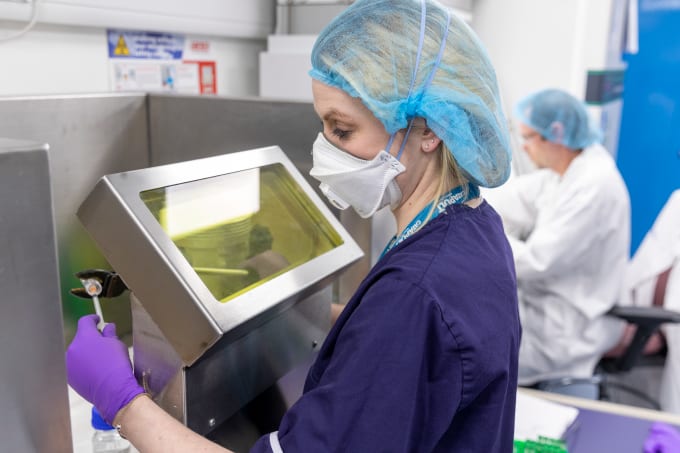With Nina Weis and Matthäus Braun
Merck’s chromatography business has a long history – it was the first manufacturer of silica products for chromatography worldwide, starting one year after the discovery of the chromatography principle in 1903. Since then, the company has filed more than 50 patent families for process chromatography around the globe and offers a huge variety of chromatography products, including affinity chromatography resins, ion exchange resins, reversed phase media, membrane adsorbers and also pre-packed columns.
An important focus for Merck is ensuring security of supply for customers. “Because of the unique product characteristics and performance, as well as the complexity and cost of qualifications, chromatography resins are often sourced from a single supplier. A chromatography resin can impact the drug product’s quality, safety and efficacy – and the effect can vary when switching to a resin from a different supplier. It can take years to replace a chromatography resin in an existing biomanufacturing process. Because of this, supply and production shortages have a huge impact on biopharma customers, which is why supply security must be a priority,” explains Nina Weis. Responsible for managing Merck’s near and long-term marketing strategy for ion exchange chromatography products, Weis has a strong focus on driving customer satisfaction.
According to Weis, supply disruption can easily equate to more than one million euros per day in lost revenue for blockbuster molecules, and it can potentially prevent patients from receiving essential medicines. “Chromatography supplies are essential for biopharma production. It is not sufficient for suppliers to focus only on delivering orders on time; it is also necessary to look to the future to better handle variations and minimize the impact of any unexpected events. In summary, long-term demand and capacity planning is crucial,” says Weis.
Planning for all occasions
At Merck, demand planning and forecasting is a collaborative process with commercial and strategic marketing. Demands can fluctuate; low demand could result in a facility being under-utilized; however, high demand can stretch a manufacturing plant, leading to bottlenecks and supply disruptions. Therefore, it’s necessary for demand planning to partner with capacity planning to review and discuss potential high-growth scenarios.
“Merck has a robust sales and operating planning (S&OP) process, which includes a monthly review of demand with commercial to understand our short and mid-term (0-18 months) customer requirements, and when orders will be placed,” says Weis. “We also have a long-range plan for our business (3-5 years) in which we take into consideration market dynamics and product lifecycle. Twice per year, a plan is provided to supply chain operations for capacity planning, future investments, resources, supply planning and more.”
Prepare for the black swan
Of course, no matter how intelligently you plan your demand and capacity, your information will never completely reflect future needs. Uncertainty must always be considered – for the short-, mid- and long-term. There can also be unexpected catastrophes, from natural disasters, to changes affecting raw materials, to breakdowns in equipment that affect capacity.
Matthäus Braun is Site Director for Merck’s Altdorf, Switzerland site, which produces chromatography resins, among other products. He says that the importance of continued supply is something Merck understands well since it is a biopharma manufacturer, as well as being a supplier business. “I like to say that it is in our DNA to look at supply risks and business continuity,” says Braun. “We apply a holistic approach in the evaluation of any potential supply risks. For raw materials, for example, our business continuity plans involve supplier quality risk management, supply qualification, and established, long-term relationships with our key suppliers. Good relationships and trust are key for mitigating supply chain risk. We also have plans in place for other scenarios, such as breakdown of installations, or other unexpected events.”
Merck’s processes for business continuity follow pre-defined, formally documented protocols that involve identifying a risk, determining and implementing an appropriate risk mitigation, which could be increasing safety stock of raw materials or qualifying a second source. Disaster recovery is also included in Merck’s business continuity plans. The Altdorf site is not located in an area prone to major natural disasters and the environment is quite stable, but Braun says that it is still important to demonstrate to customers that the company has assessed the risks and has structured plans in place to reduce any recovery timelines, should anything happen. Braun says, “Our integrated supply chain operations organization has other sites in which we manufacture chromatography products and have subject matter expertise.”
“It’s really important to stay ahead of customers and market demand,” Weis says. “We watch industry trends very carefully and listen to what our customers are telling us; and we have invested steadily in our manufacturing capabilities to expand capacity and increase manufacturing standards according to the requirements of the biopharma industry. We have a large, state-of-the-art manufacturing network that produces our resins and membranes.”
“Recently, we implemented a new production line in Altdorf to help us adjust to increased demand,” adds Braun. “But we have the internal capacity to revert back to the previous production line if there is an issue with the new line. With everything we do, we also consider the ‘black swan’ situation and what might happen to production. It is important to have defined recovery plans and timelines.”
Everybody wins
Whatever happens in the supply chain, both Weis and Braun agree that collaboration and communication with customers is crucial. “First of all, you can’t just sell products without true knowledge about what they are used for,” says Weis. “You also need to understand what clinical phase your customer is at – are they preparing to go into commercial manufacturing, for example? Are their demands suddenly going to increase? Transparency goes a long way to making sure we understand our customer’s needs and can continue to supply our products at the right time, in the right quality. We also partner with our suppliers to ensure transparency and a true collaborative business approach – a win-win situation for both parties that can strengthen the supply chain.”
Open, regular dialogue with customers also builds trust. Braun adds, “Customers need to be able to trust that their supplier has effective plans in place to make sure supply will not be interrupted. A good relationship is key. In Altdorf, customers really appreciated how we demonstrated product equivalence from the previous production line to the new line, and how we managed the change. We also have an excellent track record with audits – something that demonstrates how well we understand the needs of our customers.”
By Katrin Jänicke, Marketing Operations Chromatography
Every change to our products creates risk for our customers: a change has the potential to affect drug product quality, safety or efficacy, as well as the process performance. If a change results in an update to a regulatory filing, this could have a negative impact on supply. At Merck, we are highly focused on minimizing the risk that changes can bring. To address this, we have developed robust and comprehensive change control strategy that ensure changes are controlled, managed and communicated stringently to sustain security of supply.
There are two different scenarios why changes can occur; i) change is initiated by the manufacturer of the chromatography product resulting from continuous improvement efforts. ii) change is initiated by the manufacturer’s supplier, such as a new supplier or a new raw material. One key element of our change control strategy is to communicate changes to our customers as early as possible to give sufficient time to prepare and assess the impact – we are targeting at least six months for change notifications prior to implementation of very complex changes. To ease our customer’s risk assessment for those changes, we provide comprehensive comparability studies and the option to order samples from different lots in case a customer decides to perform additional testing. We understand that qualifying a change requires considerable effort; therefore we try to find a good balance between continuous improvement and minimizing the number of changes. In addition, we’re actively seeking the exchange with the industry. One example for this is the one-on-one exchange with customers where we present a specific change, and give the opportunity to ask questions and to provide feedback on how we can further improve our change control strategy. Another example is our involvement in industry consortia, such as the BioPhorum Operations Group (BPOG), where representatives from our company meet with other representatives from the biopharmaceutical industry to discuss and align on change notification needs and best practices.
The life science business of Merck operates as MilliporeSigma in the US and Canada.






